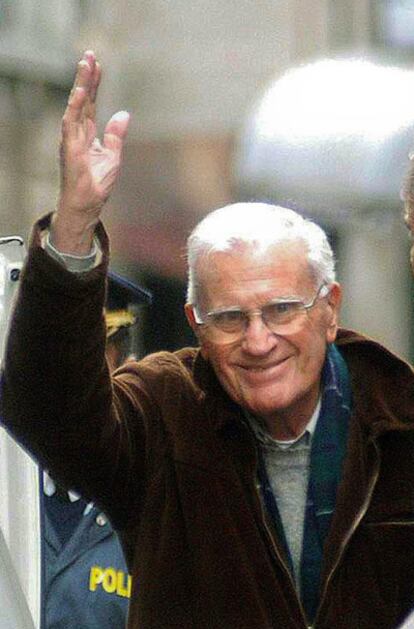Uruguay's civilian dictator dies at 83
Bordaberry was serving a 30-year house-arrest sentence for murder
In 1993, Augusto Pinochet traveled to Uruguay to meet up with "many friends," as he put it. One of them was former President Juan María Bordaberry. "I came here to remember the old days. I am a friend of the general," said the former Chilean dictator.
A leading figure in the 1973 coup that instituted a bloody military dictatorship, Bordaberry ruled Uruguay until 1976. In 2006 he was sentenced to 30 years in prison for six murders and crimes connected to the disappearance of nine people.
On Sunday, the 83-year-old former dictator died in his home in Montevideo, where he was under house arrest. Dozens of human rights activists gathered outside the cemetery on Monday where his funeral was held.
While elected democratically in 1972, later - on June 27, 1973 - Bordaberry banned political parties, dissolved the nation's parliament and created a military-controlled state council, which governed the country, while staying on as president.
Unlike the military tyrannies in Argentina, Chile or Brazil, Uruguay's was a dictatorship with a civilian at its head with the military overseeing his administration. But the false international image of democracy did not diminish the cruelty of the regime. "One of every three Uruguayans has gone abroad, one in 50 has been in prison and one in 100 has been tortured," said the journalist Claudio Trobo, during a 1978 EL PAÍS interview.
A government commission created in 2000 concluded that the Uruguayan dictatorship was directly responsible for the disappearance of 38 people in the country, 182 in Argentina, eight in Chile, two in Paraguay and one in Brazil.
A descendent of French Basque immigrants, Bordaberry was born in 1928 to wealthy landowners. His first contact with politics was through the agriculture industry he inherited from his father. During the three years of his government, Uruguay sank into a deep economic crisis as it maintained a close collaboration with dictatorships in Argentina and Chile. Bordaberry bore no sympathy for political parties, which was precisely the cause that led to the military ousting him in a quiet, behind-the-scenes coup.
The military command was in favor of keeping the parties that had not been banned while Bordaberry advocated the creation of a "new Uruguayan government" in which all political parties would be prohibited. In 1976, the military decided to remove him as president and replaced him with another civilian, Alberto Demicheli.
Despite his disagreement with the military, he was not forced to leave the country after leaving office. Bordaberry withdrew from politics and returned to his ranch. But criminal investigations years later concluded that during this period he had acted as an agent of Operation Condor, the secret coordinated effort of the intelligence services of the Latin American dictatorships to annihilate opponents, communists and so-called subversives.
Democracy returned to Uruguay in 1985, but 20 years passed before Bordaberry faced prosecution. In 2005, he went on trial for the 1976 Buenos Aires murders of two Uruguayan lawmakers, as well as for the deaths of two former guerrillas. He was also charged with violating the Constitution, crimes connected to the forced disappearance of nine people and two other murders. Bordaberry was arrested on November 16, 2006, but only spent one year in jail. Because of poor health, he was put under house arrest in 2007 and given a 30-year sentence for these crimes.

Tu suscripción se está usando en otro dispositivo
¿Quieres añadir otro usuario a tu suscripción?
Si continúas leyendo en este dispositivo, no se podrá leer en el otro.
FlechaTu suscripción se está usando en otro dispositivo y solo puedes acceder a EL PAÍS desde un dispositivo a la vez.
Si quieres compartir tu cuenta, cambia tu suscripción a la modalidad Premium, así podrás añadir otro usuario. Cada uno accederá con su propia cuenta de email, lo que os permitirá personalizar vuestra experiencia en EL PAÍS.
¿Tienes una suscripción de empresa? Accede aquí para contratar más cuentas.
En el caso de no saber quién está usando tu cuenta, te recomendamos cambiar tu contraseña aquí.
Si decides continuar compartiendo tu cuenta, este mensaje se mostrará en tu dispositivo y en el de la otra persona que está usando tu cuenta de forma indefinida, afectando a tu experiencia de lectura. Puedes consultar aquí los términos y condiciones de la suscripción digital.








































